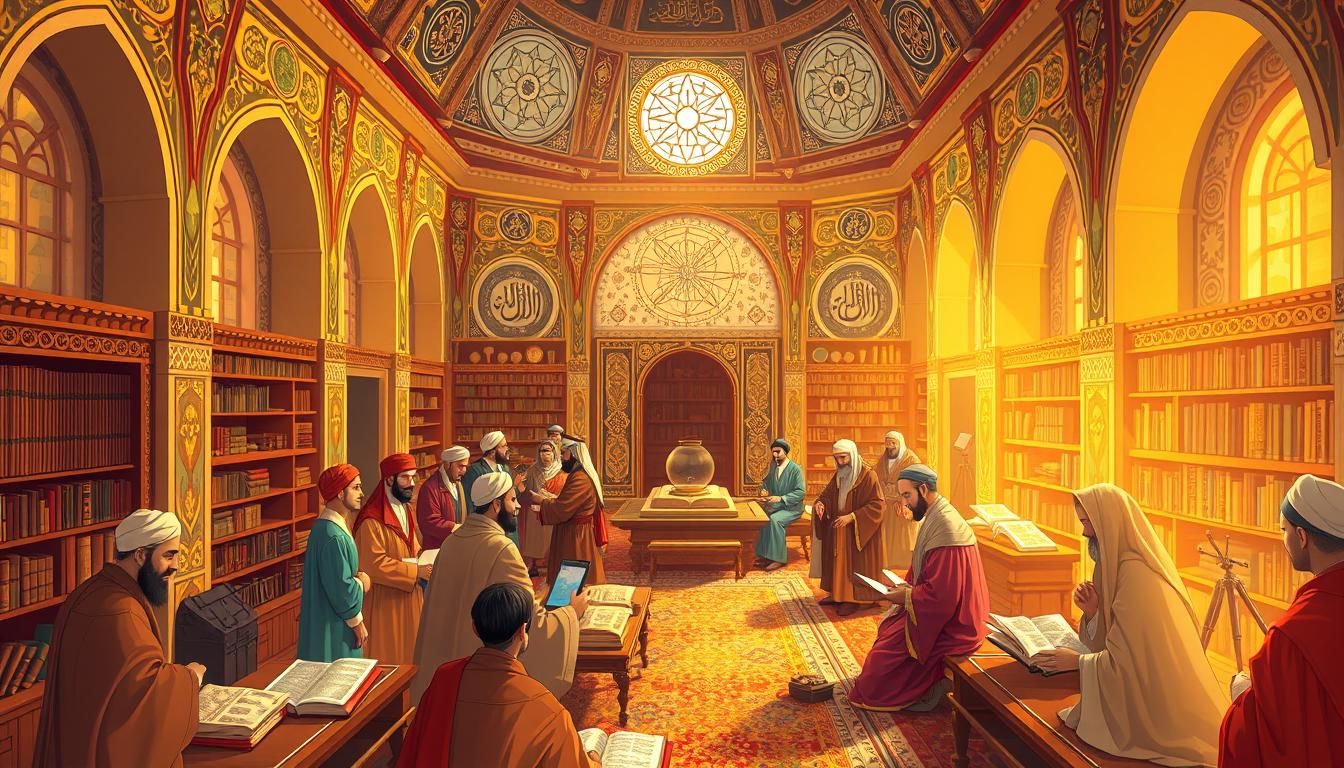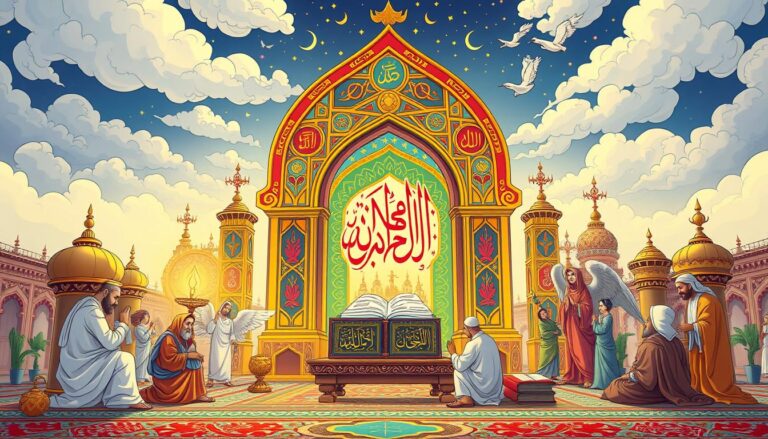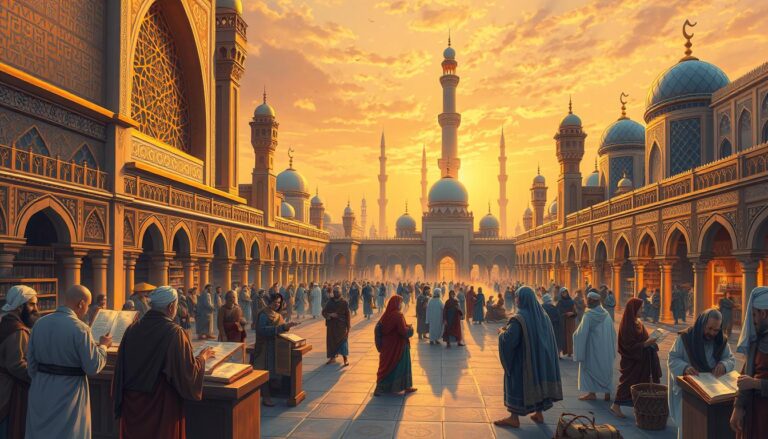How Islam Paved the Way for Scientific Discoveries
Did you know the Islamic world was once the center of scientific progress? It outshone Europe for centuries. The Islamic Golden Age was a time of great intellectual growth, leading to discoveries that shape our world today.
From the 8th to the 13th centuries, Muslim scholars led human achievements. They made key contributions to algebra, astronomy, medicine, and chemistry. Arabic science thrived, becoming the common language of science.
The Islamic tradition, based on the Quran, inspired many. It created a unique view that sparked curiosity and scientific inquiry. This rich culture was the perfect setting for scientific growth.
Figures like Ibn Sina and Al-Biruni showed how faith and reason could work together. They looked for divine guidance in their scientific quests. This view of nature as God’s creation helped us understand the world better.
Key Takeaways
- The Islamic Golden Age spanned from the 8th to the 13th centuries
- Muslim scholars made significant contributions to algebra, astronomy, medicine, and chemistry
- Arabic became the primary language of scientific discourse
- Islam’s worldview inspired scientific inquiry and discovery
- Notable scientists like Ibn Sina and Al-Biruni blended faith with scientific reasoning
The Golden Age of Islamic Science
The Islamic Golden Age lasted from the 8th to the 13th century. It was a time of great scientific progress and medieval advancements. Islamic scholars made huge contributions in many fields, changing the way we understand the world.
Timeline of the Islamic Golden Age
Many brilliant minds came to life during this era. Muhammad ibn Musa al-Khwarizmi, known as The Father of Algebra, lived from 780 to 850. Abu Rayhan Muhammad ibn Ahmad al-Biruni, a prolific scholar, wrote around 146 works between 973 and 1048.
Key Centers of Learning and Innovation
Baghdad’s House of Wisdom, started in the 9th century, was a key place for science. It was founded by Caliph Haroun Al-Rashid. Scholars there translated important texts into Arabic, creating a rich learning environment. Cairo and Córdoba were also major centers of scientific progress.
Contrast with European Dark Ages
While Europe was in the Dark Ages, the Islamic world was full of scientific breakthroughs. Ismail Al-Jazari, the father of modern engineering, and Ibn al-Haytham, who invented the camera obscura, made huge strides. Their work set the stage for many modern scientific discoveries, showing a big difference between Islamic progress and European stagnation.
“The scientific achievements during the Golden Age of Islam have had a lasting impact on the world we know today.”
Foundations of Islamic Scientific Thought
Islamic philosophy set the stage for major scientific breakthroughs during the Golden Age of Islam. The idea of Tawhid, or the Oneness of God, was key. It helped Muslim scholars see the natural world as a sign of divine creation.
The Quran had a big impact on Islamic science. It made Muslims want to learn more, seeing knowledge as a religious duty. This led to many learning centers popping up, from Baghdad to Cordoba.
Muslim scholars combined faith and reason in their search for knowledge. They saw science as a way to understand God’s creation better. This led to big steps forward in many areas:
- Mathematics: Muhammad ibn Musa al-Khwarizmi introduced algebra and Indian numerals
- Medicine: Ibn Sina wrote the Canon of Medicine, a key text for ages
- Astronomy: Mariam al-Ijliya improved tools like the astrolabe
- Optics: Hasan Ibn al-Haytham made big strides in vision theory
The Islamic scientific tradition focused on observing, experimenting, and using logic. This approach helped create the modern scientific method. Today, the Ismaili community honors this legacy of innovation in November.
Astronomy: Revolutionizing Our Understanding of the Cosmos
The Islamic Golden Age was from the 8th to the 14th century. It was a time of great change in astronomy. Arabic Science made big steps forward, going beyond Ptolemy’s Almagest. This laid the foundation for our modern understanding of the sky.
Pioneering Observatories and Instruments
Muslim astronomers built advanced observatories. Places like the Umayyad Mosque in Damascus and the Maragheh Observatory in Persia were key. These spots were hubs for new discoveries in astronomy.
The astrolabe, a complex tool from this time, was crucial for space measurements and navigation. It was used for centuries.
Celestial Mapping and Calculations
Islamic scholars greatly improved our maps of the sky. Abd al-Rahman al-Sufi’s “The Book of Fixed Stars” included detailed notes on stars. It even mentioned the Andromeda galaxy, the first recorded sighting.
Ibn Yunus also improved Ptolemy’s work on planets and Earth’s movement. His work helped us understand the universe better.
Legacy in Modern Astronomy
Islamic astronomy’s influence is still felt today. Many stars are named in Arabic, showing the lasting impact of Arabic Science. Today, places like Turkey and Indonesia are leading in astronomy research.
They are carrying on the tradition of exploring the sky that started in the Islamic Golden Age.
“The Arabic language was synonymous with learning and science for 500 years during the Islamic Golden Age.”
Mathematics: The Language of Scientific Progress
Islamic mathematics thrived from the 8th to the 14th century. Muslim scholars made huge strides in many areas of math. Their work laid the groundwork for today’s scientific advancements.
In the 9th century, algebra became its own field. Muhammad ibn Musa al-Khwārizmī, in Baghdad from 813 to 833, was key in starting algebra. He introduced new ideas and words, paving the way for algebra’s development.
Islamic mathematicians also improved the place-value system to include decimal fractions. They made big leaps in geometry and trigonometry. They used words instead of symbols, creating a strong math framework that later influenced Europe.
“The adoption of the Hindu-Arabic numerical system influenced European mathematics, and the term ‘algorithm’ derives from Al-Khwarizmi’s work.”
Arabic math’s practical nature helped it spread to the West. Scholars used these ideas to solve real-world problems. This method was crucial in reviving math in Western Europe after the Dark Ages.
- Al-Khwārizmī’s algebra text was translated into Latin in 1145
- Arabic mathematical texts were widely translated in the 12th century
- Islamic scholars systematized the study of algebra
The influence of Islamic math on science is clear. They introduced the decimal system and laid the algebraic foundations. These contributions still shape our math and science today.
Medicine and Biology: Healing and Understanding Life
Islamic medicine changed healthcare during the Golden Age of Islam. Muslim scholars made big discoveries in anatomy, physiology, and pharmacology. Their work shaped medical practices for many years.
Innovations in Medical Practices
Muslim doctors started clinical trials and new surgery techniques. They built the first hospitals and schools, creating the base for today’s healthcare. These changes greatly improved patient care and medical knowledge.
Contributions to Anatomy and Physiology
Islamic scholars greatly helped us understand the human body. Ibn Al-Nafis figured out pulmonary circulation over 300 years before William Harvey. This discovery changed old beliefs and helped start modern heart medicine.
Development of Pharmacology
Muslim scientists led in pharmacology. They created new medicines and improved old ones. They used distillation and alcohol as antiseptics, ideas still used today. These steps in Islamic medicine gave doctors more treatment options.
Important Muslim scholars like Ibn Sina (Avicenna) and Al-Razi (Rhazes) wrote big medical books. These books were used in European schools for centuries, shaping medical education. Islamic medicine’s impact still guides today’s healthcare and research.
Chemistry and Alchemy: Laying the Groundwork for Modern Chemistry
Islamic alchemy was key in shaping modern chemistry. After the Roman Empire fell, the Islamic world became a center for alchemy. Muslim chemists and alchemists made discoveries that set the stage for future science.
Jabir ibn Hayyan, known as Geber, is called the father of chemistry. He brought the experimental method to chemistry. His work focused on practical experiments, moving away from Greek allegories.
Jabir’s teachings were systematic and clear. They prepared the way for new chemical discoveries.
Islamic alchemists also developed important tools. They created the alembic, still, and retort. These tools were key for distillation, liquefaction, and purification.
They discovered substances like:
- Muriatic acid
- Sulfuric acid
- Nitric acid
- Distilled water
- Purified alcohol
Their scientific approach changed alchemy into a more scientific field. This shift helped lead to later discoveries in chemistry. It included finding acids, bases, and salts.
“The contributions of Islamic alchemists to experimental science in chemistry are highly significant.”
The influence of Islamic alchemy still shows in modern chemistry. The chemical classifications from the Islamic Golden Age are still used today. This shows the lasting effect of their early work on science.
How Islam Paved the Way for Scientific Discoveries
Islamic philosophy was key in the Golden Age of Islam. This time, from the 8th to the 13th century CE, saw big steps in many fields.
The Role of Islamic Philosophy in Scientific Inquiry
Islamic philosophy mixed faith and reason in a special way. Scholars thought studying nature helped them understand God’s creation. This led to many new discoveries and ideas in different areas.
Integration of Faith and Reason
The idea of Tawhid, or God’s oneness, united understanding of the universe. This belief pushed Muslim scientists to learn and explore. Baghdad’s House of Wisdom, where Greek knowledge was gathered, was a hub of learning.
Islamic Ethical Framework for Scientific Research
Islamic scholars created an ethical guide for science based on the Quran. This guide focused on observing, experimenting, and using logic. It set the stage for the Scientific Revolution.
- Muslims invented crucial scientific tools like the clock pendulum and astrolabe
- Ibn al-Haytham founded Optics science, advancing our understanding of light and vision
- Al-Khawarizmi, a Persian Muslim scholar, invented Algebra
The impact of Islamic philosophy on science still shapes today’s research and ethics.
Notable Muslim Scientists and Their Contributions
Muslim scholars made huge scientific breakthroughs during the Islamic Golden Age. Their discoveries set the stage for many modern sciences. Let’s look at some of these brilliant minds and their lasting effects.
Al-Khwarizmi, a Persian mathematician, changed the game in mathematics. He introduced algorithms and Arabic numerals to the West. His work on algebra was key to scientific progress.
Ibn al-Haytham, known as the father of modern optics, made big strides in light and vision. His research helped create cameras and other optical tools.
In medicine, Ibn Sina’s work was unmatched. His “Canon of Medicine” was a top medical text in Europe for centuries. Al-Razi, another famous doctor, made key discoveries in medicine and chemistry.
- Al-Biruni excelled in astronomy and geography
- Ibn Rushd integrated Aristotelian philosophy with Islamic thought
- Ibn Battuta’s extensive travels expanded geographical knowledge
These Muslim scholars’ scientific achievements covered many areas. Their work in mathematics, optics, medicine, astronomy, and philosophy greatly influenced science. Their discoveries still shape modern science and technology.
“The ink of the scholar is more sacred than the blood of the martyr.” – Prophet Muhammad
The Legacy of Islamic Science in the Modern World
Islamic science still shapes our world today. Muslim scholars’ work from the Scientific Revolution impacts us now. It influences how we think and do science.
Renaissance and Enlightenment Influence
Translating Arabic science into Latin sparked a big change in Europe. Works by 11th-century doctor Avicenna were used in schools until the 1600s. This helped start the European Renaissance.
Lasting Impact on Scientific Fields
Muslim scientists made big strides in many areas. They added surgery to medicine, created modern hospitals, and started new studies like gynecology. Their work is the base of today’s medicine.
Arabic Names in Modern Astronomy
Our night sky shows Islamic astronomy’s impact. About 200 stars and 24 lunar craters are named after Muslim astronomers. These names honor Islamic contributions to space study.
“Arabs are the true founders of physics.” – A. Humboldt
Islamic science’s legacy is seen in medicine and astronomy today. It shows the lasting effect of scientific curiosity and sharing knowledge across cultures.
Challenges and Decline of Islamic Scientific Dominance
The decline of Islamic science was a big change in global science leadership. This started around the 13th century. Political troubles, economic hard times, and a lack of new ideas all hurt the Islamic world’s science.
Islamic societies faced many challenges. The Mongol invasion of Baghdad in 1258 was a big hit. It destroyed a lot of knowledge and manuscripts.
Religious strictness also played a part. Some say the end of ijtihad (independent thinking) stopped new science. This move to strict religious views might have slowed down scientific progress.
“The Muslim world’s population was fixed at 1,571,198,000 in 2012, representing 24% of the world’s total population, with an expected increase of 35% by 2030.”
But not all Islamic areas fell behind. Some places kept making big scientific discoveries until the 15th century. The Ottoman Empire, for example, made big strides in military tech, like guns and siege machines.
Now, there’s a push to bring back science in the Islamic world. Scholars and places of learning are trying to link Islamic history with today’s science. They want to bring back the innovation that once marked Islamic science.
Reviving the Spirit of Scientific Inquiry in the Islamic World
The Islamic world is working hard to regain its scientific glory. Modern Islamic science is growing, combining old wisdom with new research. This revival aims to bring back the creativity of the Golden Age of Islam.
Current Initiatives and Research Programs
Many Muslim-majority countries are starting new projects. For example, the Qatar Exoplanet Survey is finding new planets, just like medieval Islamic astronomers did. These projects show how modern Islamic science can help the world.
Bridging Islamic Heritage and Modern Science
There’s a big effort to mix science education with Islamic values. This goal is to motivate Muslim students to become scientists and innovators. By combining Islamic teachings with science, these programs aim to spark curiosity and discovery.
Potential for Future Contributions
The future is bright for Islamic science. The Qur’an has many verses about nature, giving a strong base for scientific study. As more research centers open in the Arab world, we might see more patents, papers, and discoveries from Muslim scientists. This could light up the world again with innovation.
Source Links
- What Makes Islamic Science Islamic?
- How Islamic scholarship birthed modern astronomy
- The Golden Age of Islam: Glimpses of Scientific Discovery and Invention (Khwarazm – Baghdad – Kufa)
- House of Wisdom: Inventions in the Islamic Golden Age — afikra | عفكرة
- The Origins of Islamic Science – Muslim Heritage
- The flourishing of science in Islam
- How did Muslims contribute to advancements in astronomy world history – Ambassador of Islam
- Astronomy and space exploration are shaping our civilization landscape
- Islam and Science | CPS GLOBAL
- A Flourishing Era of Science and Culture
- How Islam kick started science
- Mathematics in the medieval Islamic world
- Why the Arabic World Turned Away from Science
- How Islam changed medicine: Arab physicians and scholars laid the basis for medical practice in Europe
- Alchemy and chemistry in medieval Islam
- Chemical Classification – (Islamic World) – Vocab, Definition, Explanations | Fiveable
- Islam and Science — Looking to Our Past to Propel our Future
- The Development of Natural Sciences in the Islamic Civilizat
- Introduction to a Special Edition on the Golden Age of Islam | Review of Religions
- Most Famous Muslim Scientists and Their Inventions
- 10 Muslim Contributions To Science And Technology
- Five Muslim inventions that shaped our world
- From the Middle East, in the Middle Ages
- THE QURʾĀN AND SCIENCE, PART III: MAKERS OF THE SCIENTIFIC MIRACULOUSNESS
- Islam Creator of the Modern Age
- The Structure of Scientific Productivity in Islamic Civilization: Orientalists’ Fables | Yaqeen Institute for Islamic Research
- Conf4_WCS
- Science under Islam: A Reflection on Past Brilliancy and Future Revival – Muslim Heritage
- Why the Arabic World Turned Away from Science ?
- QURAN INSPIRES MODERN SCIENCE







